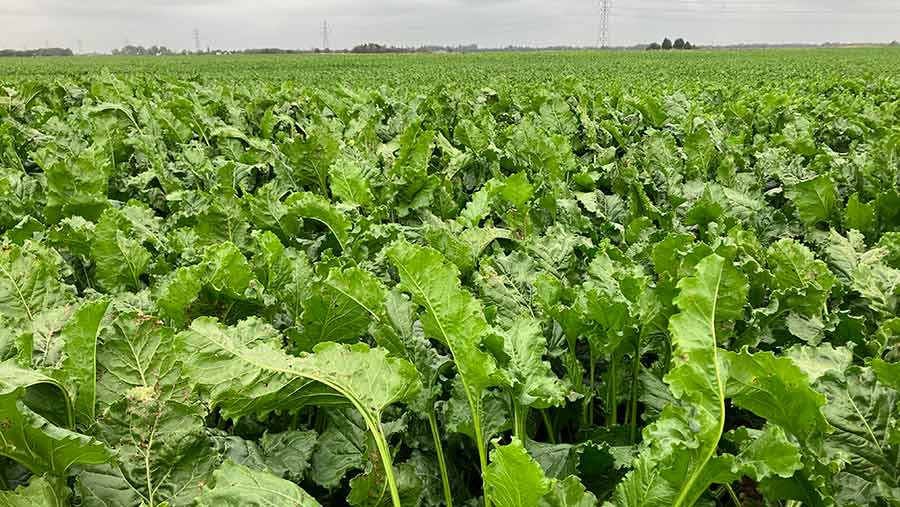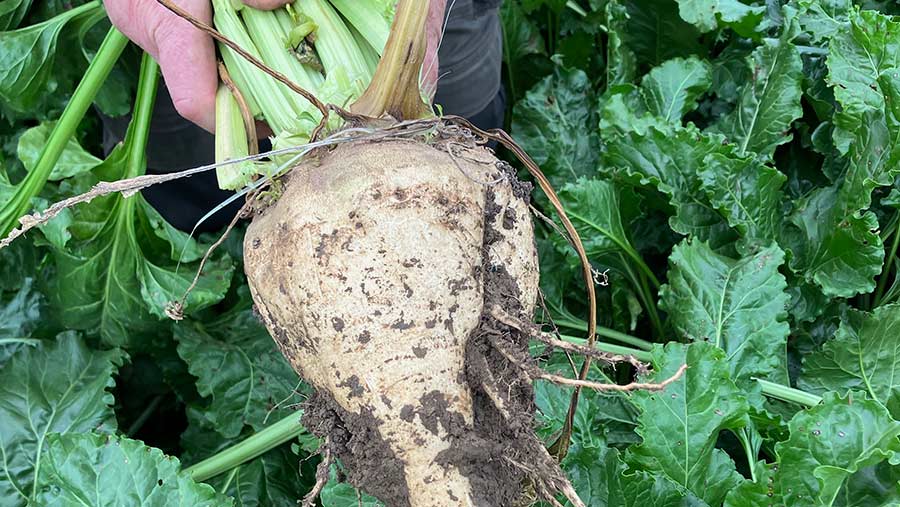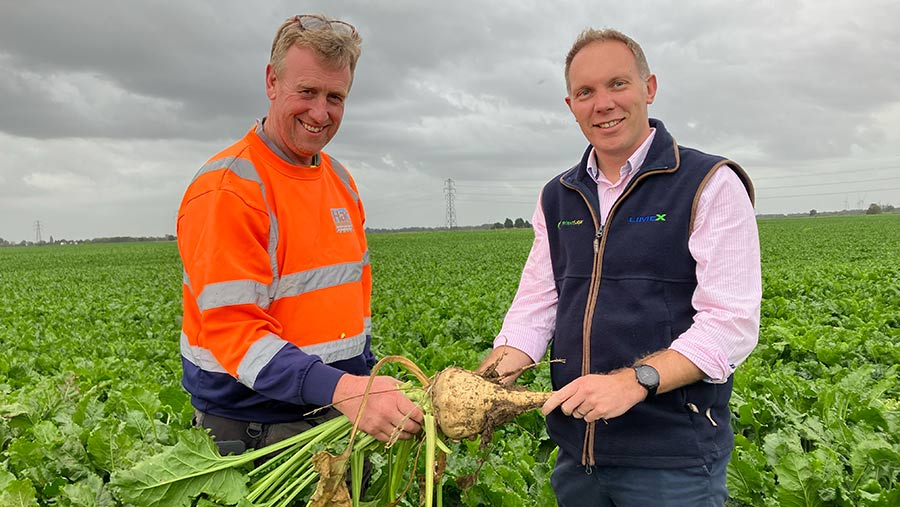Early sugar beet yields promising for Cambridgeshire grower
 Sugar beet © MAG/Emma Gillbard
Sugar beet © MAG/Emma Gillbard Sugar beet growers have made an unusually early start to this year’s beet harvest as British Sugar offers a premium for early-lifted crops in an attempt to make up for last season’s 250,000t sugar shortage.
Cambridgeshire sugar beet grower and contractor Nigel Harrison is one of the farmers making the most of the early-lift premium as beet factories promptly opened their doors.
See also: How measured soil carbon credits can replace BPS income
“We started harvest a good two to three weeks earlier than usual on 4 September and have now lifted about 2,400 acres of beet,” says Nigel.
“It was a tough turnaround for the team as we only just finished cereal harvest, but the premium, reduced soil compaction risks and ability to get a wheat crop established behind the early lifts are huge benefits.”
Crop establishment and plans for strip-till sugar beet at Speedwell Farm

Sugar beet harvest © MAG/Emma Gillbard
Sugar beet has always been a major part of Cambridgeshire grower Nigel Harrison’s farm as both a grower and contractor, which is why growing a profitable and sustainable crop is a key production driver.
Nigel runs a non-inversion tillage system at his county council-owned Speedwell Farm near Wisbech, where he farms 800ha of tenant and contract farming agreements.
In total, he grows 100ha of his own sugar beet and contract harvests an additional 2,000ha with his two beet harvesters.
Ever since he shifted to a non-inversion system, weed beet has almost been completely eradicated and crops have developed a more even canopy.
He now hopes to take cultivation cutbacks to the next stage and establish a strip-till sugar beet crop that incorporates cover crops to improve soil health.
“Finance is the main driver, as we always need to get better at what we do and cut down on production costs,” says Nigel.
His plan is to establish the cover crop during the autumn cultivation, aiming for 40% of the area to be cover cropped, which he hopes will qualify for the Sustainable Farming Incentive payment.
He then aims to establish sugar beet in a one-pass system and cut back on his spring cultivation.
Nigel is working closely with British Sugar to develop effective crop establishment methods.
Yields and sugar
Yields and sugar content are performing well considering the early harvest, with yield reports ranging from 50t/ha to 100t/ha across a number of farms Nigel has harvested to date.
“It is exceptional to be reaching highs of 100t/ha this early on in the campaign. I think we could be on for some record-breaking yields with later lifted fields,” he says.
This comes after wet spring conditions delayed drilling, which saw a significant proportion of UK beet crops planted four to five weeks later than usual.
Combined with the earlier harvest, crops missed out on almost two months of the growing season.
“Crops are full of potential, with lots of green leaf area. Virus yellows, beet moth and cercospora have not been problematic and we didn’t use neonic-treated seed,” adds Nigel.

Nigel Harrison, Cambridgeshire grower, and British Sugar agricultural director Dan Green © MAG/Emma Gillbard
A word from British Sugar
British Sugar agricultural director Dan Green continues that despite the late drilling and early harvest, the campaign has got off to a promising start, with all four UK beet factories now open.
“Sugar contents are averaging 16-17% so far. Traditionally, sugar content increases as the season persists, so we’re pleased at this early stage,” he says.
Early factory open dates
The first of British Sugar’s four factories to open for deliveries was Bury St Edmunds, Suffolk, on 4 September, followed by Newark, Nottinghamshire on 11 September.
The site at Wissington, Norfolk, was the next to open on 21 September, with Cantley, Norwich the final factory to accept beet from 9 October.
“The silver lining of drilling later is crops made the most out of increasing daylight hours and warming soils, allowing the crop to get up and away quickly, which points to the resilience of the crop,” he adds.
British Sugar aims to process 1m tonnes of sugar annually, but last season saw them down 250,000t on their annual target.
What caused this sugar shortfall?
A smaller national crop of 88,000ha compared with the usual 100,000ha target area initiated the shortage, but freezing temperatures and hard frosts in December battered crops and only added to further losses.
“British Sugar was looking to fill this sugar gap and, therefore, started factories earlier and offered growers an early delivery allowance to offset last season’s losses.
“We offered a premium of 20p per day increase backwards from 30 September to a max of £4, ie 30 September = + 20p and 29 September = + 40p etc,” says Dan.
“With a 48% increase in beet price to £40/t on last season’s pricing, we are up on area,” he says.
Increasing supply-chain efficiency
Going forward, for growers and contractors such as Nigel an earlier beet harvest is an attractive option as it minimises risks of wet winter harvest conditions, which can damage soil structure and allow for an early entry of winter wheat.
“Many growers may have left the industry if it weren’t for early lift opportunities, so I hope at least one factory is opened early next year, so beet remains an attractive option,” says Nigel.
With this in mind, British Sugar has developed its adaptable field campaign plan, which aims to increase supply-chain efficiency and visibility for growers, contractors, harvesters, hauliers and factory processors.
“Sugar beet growers are all different. Whether it’s different soil types, varieties or harvest dates, it’s important we look at optimising efficiencies across the entire supply chain.
“We’re hoping to promote lifting timings according to what suits soil, crop and grower requirements, and early factory opening dates has potential to be a part of this,” says Dan.
New pricing for the 2024-25 sugar beet campaign
Sugar beet growers have been offered a guaranteed minimum beet price of £37.50/t by British Sugar for the 2024-25 contract season, with the benefit of a market-linked bonus.
However, a final deal is yet to be agreed as negotiations remain ongoing with NFU sugar.
“Since the beet price was set last year, grower input costs have reduced. Prices of other crops have fallen, such as wheat by 30%, and oilseed rape by 35%.
“Our minimum price reflects this fall back in key input costs,” says British Sugar agricultural director Dan Green.
Alongside this, British Sugar is also offering growers a market-linked bonus that relates to current sugar market prices.
“Current market trends for sugar are strong. Although it is difficult for us to predict where sugar prices will be this time next year, if market prices stay where they are today the bonus scheme and guaranteed £37.50/t would see a higher overall beet price than the £40/t paid this season.

